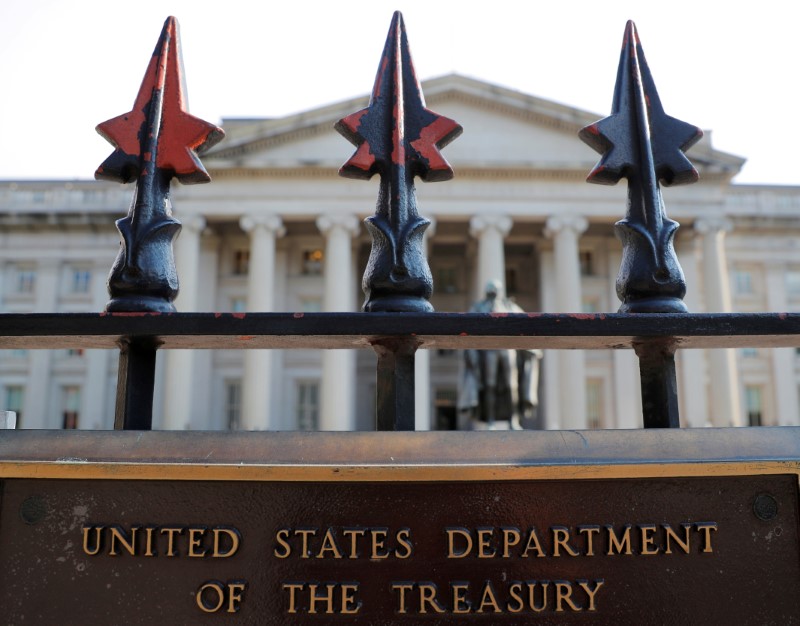
FILE PHOTO: A sign marks the U.S Treasury Department in Washington, U.S., August 6, 2018. REUTERS/Brian Snyder/File Photo
August 24, 2018
By Amanda Becker and Laila Kearney
WASHINGTON/NEW YORK (Reuters) – The U.S. Treasury Department and Internal Revenue Service on Thursday moved to block high-tax states from helping taxpayers circumvent the new cap on federal deductions for state and local tax payments.
The Republican tax law enacted in December capped at $10,000 the deduction taxpayers can claim on their federal tax return for state and local tax payments, including property and income taxes, known as SALT. The deduction was previously unlimited.
The highest state and local tax rates tend to be in Democratic-leaning areas, and critics of the capped SALT deduction say it was designed to disproportionately impact taxpayers in those states.
After the law’s enactment, some high-tax states moved to set up funds for public services to which taxpayers can make donations, receive credits against owed state and local taxes and then claim the payments as charitable deductions on their federal returns.
The rule proposed by Treasury and the IRS on Thursday would apply existing tax law related to charitable donations, which allows taxpayers to deduct only the portion for which they derived no personal benefit, such as a state or local tax credit.
“Congress limited the deduction for state and local taxes that predominantly benefited high-income earners to help pay for major tax cuts for American families,” Treasury Secretary Steven Mnuchin said in a statement.
“The proposed rule will uphold that limitation by preventing attempts to convert tax payments into charitable contributions,” he added.
The tax law slashed the top corporate tax rate to 21 percent from 35 percent and temporarily cut individual rates. It roughly doubled the standard deduction, but limited or eliminated other popular deductions, such as for SALT.
Democrats criticized the law as a giveaway to corporations and the wealthy that is expected to add $1.9 trillion to the national debt over ten years, according to government estimates.
New York, which has a top state income tax rate of 8.82 percent and where the average SALT deduction was more than $22,000 in 2015, according to the Tax Policy Center, established a fund supporting public services.
Taxpayers who contribute receive an 85 percent credit on their New York tax bill. The idea was that taxpayers could then fully deduct the contribution as a charitable donation on their federal tax return.
Under the proposed rule, however, a New York taxpayer could not receive a federal charitable deduction for the portion of their donation to the fund for which they received a state tax credit, unless the credit was for 15 percent or less.
“If you make a donation of $100 and you get a big chunk of that back in state tax credits, say $85, you can’t go to the IRS and say I gave $100, I should be able to get a $100 deduction,” said Carl Davis, research director at the Institute on Taxation and Economic Policy, a nonpartisan think tank.
“You can only deduct the amount you actually sacrificed, that $15 that wasn’t already reimbursed,” Davis added.
New York Governor Andrew Cuomo, a Democrat, said on Thursday that Treasury and the IRS had proposed “politically motivated regulations” and the state would “fight back.”
New York, along with Connecticut, Maryland and New Jersey, last month filed a federal lawsuit challenging the constitutionality of the SALT deduction cap.
Legal experts said the proposed rule did not differentiate between new funds set up by high-tax states and dozens of pre-existing programs, including in Republican-led states.
In Alabama, for example, taxpayers are eligible for a state tax credit for contributions to nonprofits that grant private-school scholarships.
“This won’t enable you to find a new work-around for the SALT cap, but if these credits made sense to you last year they’ll still make sense to you this year,” said Jared Walczak, an analyst at the pro-business Tax Foundation.
Republican Representative Kevin Brady of Texas, one of seven U.S. states with no income tax of its own, and a tax law architect, said in a statement that the proposed rules “rightly close the door on improper tax evasion schemes conjured up by state and local politicians.”
“As for states that have long-standing tax credit programs … we encourage you to review the proposed regulations and make full use of the comment period,” Brady added.
There is a 45-day period to submit written comments, according to the IRS and Treasury notice.
(Graphics: U.S. states with the highest and lowest income tax rates: https://tmsnrt.rs/2waGSWi)
(Reporting by Amanda Becker and Laila Kearney; Editing by Lisa Shumaker and Leslie Adler)
